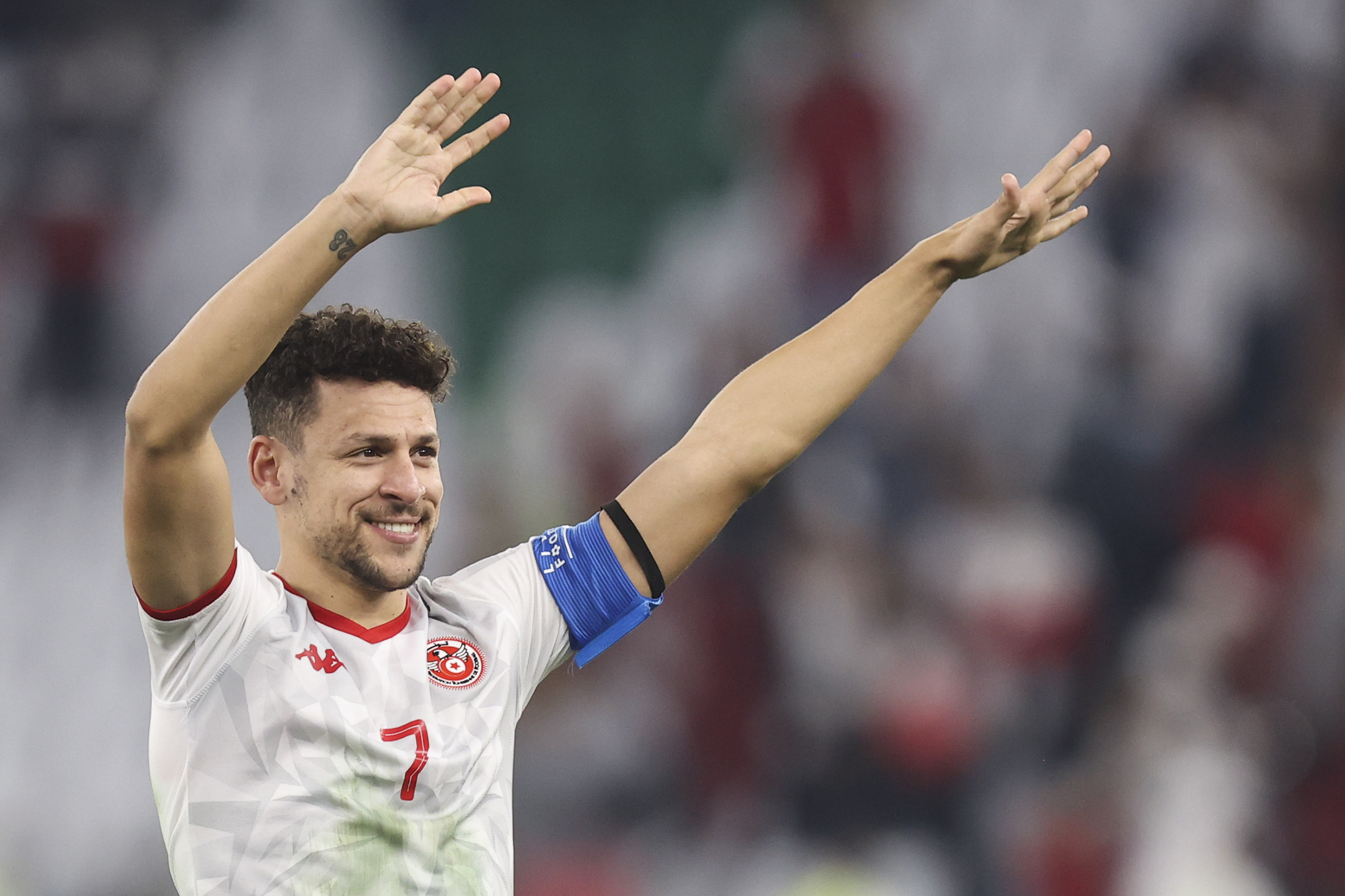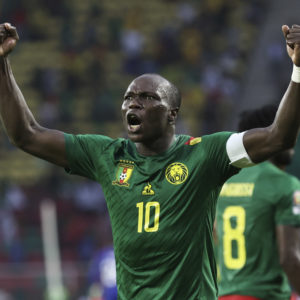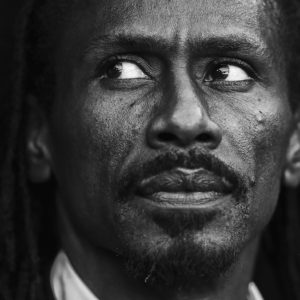The waning genius of Youssef Msakni
The gifted player chose financial security over European fame by playing in the Gulf. It’s a route many Tunisian footballers take, with experts saying it is to the detriment of the national team.
Author:
26 March 2022

Youssef Msakni took Tunisians on a stroll down memory lane – and to the quarterfinals of the Africa Cup of Nations (Afcon) earlier this year – with a deft move and an elegant finish. He avoided Nigeria’s Wilfred Ndidi with a clever feint before unleashing a poisonous shot that stung goalkeeper Maduka Olmkoye’s hand.
The Al-Arabi winger’s superior football knowledge thwarted the ambitions of the refreshed Nigeria side that had amazed the continent in the group stage. Msakni reminded everyone why he is an icon of African football. The 31-year-old’s intelligence on the pitch made football enthusiasts wonder why they couldn’t enjoy his skills more regularly at a higher level.
When he moved to Al-Duhail in 2013 as a 21-year-old – after having starred at Espérance, winning four consecutive Tunisian leagues and a CAF Champions League in 2011 – Msakni got to enjoy the luxury of Qatar but not much wider exposure. The international footballing world caught glimpses of his talent only when he played for the Tunisian national team.
Related article:
Msakni saw Qatar as a stepping stone to Europe, where he had attracted interest from Paris Saint-Germain, which like Al-Duhail is owned by the Emir of Qatar Tamim Bin Hamad al-Thani. He said he passed on a more lucrative contract in Russia because he was interested not only in the economic aspect of the game but also in making the best choice from a footballing point of view.
But the solid economic certainty that Qatar offers ended up trapping Msakni’s talent in the small Gulf monarchy. His only experience in Europe is the seven matches he played at KAS Eupen, another club owned by the al-Thani family, in 2019. He scored a wonderful goal and performed decently in Belgium, but his fate was sealed. It wasn’t a real attempt to pursue a career in Europe. Rather, it was a loan transfer to brush up on Msakni’s value after he injured his knee in 2018.
Financial security
Msakni allegedly earns around €120 000 (about R1.95 million) a month, excluding prize money. He is not the only Tunisian footballer to choose the financial security that the Gulf region provides over the so-called European dream. Many wouldn’t start out earning that kind of money at a European club. They’d have to spend a few years paying their dues first, without any guarantee that they’d reach those financial heights.
“It’s difficult for Tunisian players to break through in Europe,” said Tarek Ghdiri, a Tunisian journalist for Zajel.tn. “It demands a level of discipline that they often don’t want to commit to. High taxes in European countries also affect their choice.”
Many Tunisian footballers come from modest or impoverished families and a career in the rich Gulf region offers economic security for them and future generations. Although it is a choice to be respected, Ghdiri agreed that a lack of ambition among Tunisians lies behind some of these decisions. “We don’t instil in young people the belief that they can also succeed and get a lot of money by playing for big European teams,” he said. “But that takes patience and discipline, and we Tunisians are always looking for the shortest path.”
Related article:
Maher Kanzari, who coached Msakni from the age of 14 to 20 at Stade Tunisien and Espérance, thinks the same way. “We are partisans of putting in the least effort. [In the Gulf states], with less effort we gain money and we are sure to play. That’s kind of the mentality here. I feel that in the players.” Kanzari was also Msakni’s coach at the Under-17 World Cup in 2007, where the then 16-year-old footballer led Tunisia to the round of 16 for the first time at the tournament, scoring three goals in the group stage.
He said the many Tunisian footballers who have failed in Europe convinced those who came after them to play in the Gulf states. “Players who have gone to the Gulf or Egypt, which now have a big market appeal, have proved that they can achieve success,” he said. “The players look at the experiences of their compatriots and see that it’s easier to go and play in Arab countries and earn more money [than in Europe]. They are sure to succeed. So the lack of ambition exists and I think that it doesn’t contribute to the development of Tunisian football.”
Kanzari said that if more Tunisian players succeed in Europe, it would take the national team to the next level. “But this is not the case yet, so we are still looking to be leaders in Africa. We have the means, we have good coaches and are tactically always strong. We don’t have great individualities, but the collective is always good. If we could just manage to produce more good players who play at the top level, we will be able to reign in African football.”
Qatar vs Europe
In January 2018, four of Tunisia’s main players in the group that would go on to feature at the World Cup in Russia later that year moved to Saudi Arabia.
“Msakni tied himself to Qatar, where he has spent many seasons and won numerous trophies, but he hasn’t really attracted offers from Europe any more since his pace is not the same,” said Ahmed Adala, a Tunisian journalist for Radio Mosaïque. “The knee injury may have also robbed him of a real experience in Europe. As the years went by, his physical strength decreased and interest in Msakni faded.”
The cultural and linguistic proximity is clearly another factor that convinces Tunisian footballers to opt for the Gulf states. “He chose to stay in Qatar because he may have found his way there,” said Kanzari. “Maybe [going to Europe] would have represented a problem from a family or religious point of view. It’s not very difficult to adapt to Qatar. Msakni found his livelihood and felt comfortable there. He could have had a great career in Europe if he had taken the risk to go, but sometimes if we are well-balanced in a place we don’t go elsewhere.”
Related article:
On the pitch, Msakni speaks little and often isolates himself from the game when things don’t go the right way. “There are many positive aspects in Msakni,” Kanzari said. “I am proud to have coached and trained such a player, but he is a little bit lazy. Gifted players are always like that, you can’t ask these players to run and work [for the team] all the time.”
But this hasn’t affected the love everyone has always felt for Msakni, who has never had any issues with his teammates, coaches or club officials. “He is a good and respectful man. He has personality and is a good leader who has always been appreciated by all the groups and staff where he has worked,” added Kanzari.
His own kind of leader
Lotfi Madjer, the son of Algerian football legend Rabah Madjer and Msakni’s former teammate at Al-Duhail, confirmed Msakni’s leadership skills, which are not always visible from the outside. “When you see everything he does on the pitch, the difference he makes in the game and how he finds the means to pull up his teammates, the only word that comes to mind to describe him is ‘leader’,” he said. “Off the pitch, he is also a person with whom you can laugh for hours. He is very friendly.”
According to Madjer, Msakni was even more enthralling when Tunisia’s matches approached. “He was always very excited before leaving for the national team, regardless of the importance of the game,” he said. “We could feel the difference when the date of the national team meeting was getting closer. We could instantly see a big change in him. He was much more focused and dedicated in order to be ready for the national team and always did as much as possible to pull his team to the top.”
Tunisia is still in the running to qualify for the 2022 World Cup that kicks off in Qatar, Msakni’s second home, in November. The Eagles of Carthage will go into the deciding leg of the qualifiers in Radés on 29 March in control after beating Mali 1-0 in the first leg in Bamako on 25 March.
In the absence of Wahbi Khazri, the injured AS Saint-Étienne striker who is Tunisia’s vice-captain, the pressure is on Msakni. He is the man on whom new coach Jalel Kadri will count. Kadri is assisted by former African champions Ali Boumnijel and Slim Ben Achour.
Related article:
A World Cup appearance for Msakni would be massive. Even though he has appeared in seven consecutive Afcons and is chasing an eighth to equal the record held by former legends Cameroon’s Rigobert Song and Egypt’s Ahmed Hassan, Msakni has never been to the World Cup. He was too young in 2006 and was ruled out by a cruciate ligament injury in his right knee a few weeks into the 2018 tournament. Msakni had helped Tunisia qualify for that World Cup, scoring a hat-trick in the decisive match against Guinea.
“We expect a lot from him,” said Kanzari. “I hope he will assume his responsibilities and live up to the task. But in any case, for us Tunisians, Msakni has already done great things for the national team and has certainly had an excellent international career.”
Msakni turns 32 on 28 October. Given his diminished physical ability, this could be his last chance to play in the most important tournament in the world. It could also be the best possible conclusion for a player who, despite some exceptional performances such as the one against Nigeria, has proven to be in the waning phase of his career.




